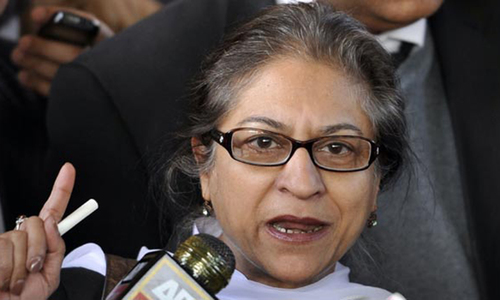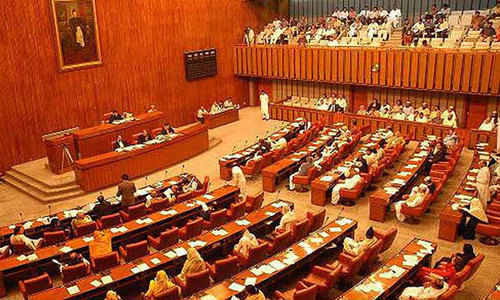ISLAMABAD: The National Assembly on Wednesday gave its assent to an amendment to the Pakistan Army Act (PAA), 1952, providing legal cover to the arrests already made by law-enforcement agencies, including the army.
Chaudhry Jaffar Iqbal, parliamentary secretary for defence, presented the bill — which has already been passed by the Senate — in the lower house. The law has already been in force in the form of a presidential ordinance since February of this year and now, pending the president’s assent, the bill will pass into law.
Also read: Sindh govt to send eight cases to military courts
The bill seeks an amendment in Section 2 of the PAA, allowing military courts to hold in-camera trials and conceal the names of court officials “for the protection of witnesses, president, members, prosecutors, defending officers and other persons concerned in court proceedings”.
“Any person arrested, detained or held in custody by the armed forces, civil armed forces or law-enforcement agencies and kept under arrest, custody or detention before the coming into force of the Pakistan Army (Amendment) Act, 2015, shall be deemed to have been arrested or detained pursuant to the provision of this act.”
Change provides retrospective cover to arrests made by law-enforcement agencies
The bill also provides indemnity to officials of the military court from any other court of law.
Legal expert Ahmer Bilal Soofi, who specialises in international law and conflict resolution, told Dawn this amendment should be viewed as a ‘law of war’ rather than a ‘law of peacetime’.
As observed in the judgment handed down by the Supreme Court in the 21st amendment case, the country currently faces a unique situation, where non-state actors were up against the state of Pakistan, he said.
Since this amendment was meant to deal with actors who had been found involved in or were suspected of waging an armed struggle against the state, countries the world over have opted for extreme measures to deal with such individuals.
But he was at pains to clarify that he would “only endorse this amendment with the caveat that it be invoked in a highly-selective manner”.
In August this year, when this bill was presented before the Senate, PPP Senator Farhatullah Babar had argued that the “practice of military courts pronouncing death penalty against unnamed accused by unnamed judges sitting at an undisclosed location and without any mention of charges, the case of the prosecution, the defence plea and disallowing independent observers violated the requirements of adequate procedural safeguards”.
On Wednesday, however, it was Dr Shireen Mazari of the PTI who said that on the face of it, this amendment violated basic human rights and questioned the need for it in the presence of the 21st amendment. Dr Nafisa Shah and Syed Naveed Qamar of the PPP also said that such laws had been in force under dictators and democratic governments should avoid them.
However, the parliamentary secretary said that in the aftermath of the Army Public School tragedy, there was a consensus across the board that the hands of the armed forces should be strengthened, adding that, “this amendment is only for [that] purpose”.
Published in Dawn, November 12th, 2015













































